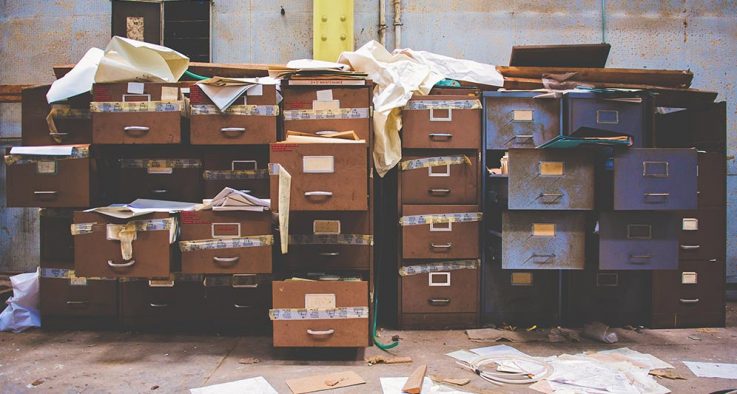Cleaning closets becomes an interesting trip down memory lane
Cleaning closets can be simultaneously cathartic, depressing, and amusing. I felt all of those emotions while sifting through 40 years of memories.
 With both kids out of the house, I’ve started a project I’ve been dreaming of for a long time — cleaning out my closets. I hate clutter, but for many years, between children and work, I had a terrible habit of looking at things and thinking, “I don’t know what to do with this — keep it? give it to charity? toss it? — so I’ll pull a Scarlett O’Hara and think about it tomorrow.” Do that often enough and you’ll open your cupboard doors and find a nightmare facing you.
With both kids out of the house, I’ve started a project I’ve been dreaming of for a long time — cleaning out my closets. I hate clutter, but for many years, between children and work, I had a terrible habit of looking at things and thinking, “I don’t know what to do with this — keep it? give it to charity? toss it? — so I’ll pull a Scarlett O’Hara and think about it tomorrow.” Do that often enough and you’ll open your cupboard doors and find a nightmare facing you.
I’ve spent most of today plowing through the really scary closet — the one with all the old paperwork. Once started, though, I made significant headway and, indeed, found a couple of treasures. (Incidentally, my closet was nowhere near as bad as the photograph illustrating this post. It just felt that bad emotionally.) The first treasure was a creative writing booklet from my junior high school, way back in 1976. I worked on that book, along with several other classmates, including Naomi Wolf. Yes, that Naomi Wolf.
Much of the book is in Chinese, since so many of the students at my school were immigrants. They were kids who came to the U.S. not speaking a word of English and, within a couple of years, were top students doing bilingual creative writing. At that time, that seemed normal to me. Looking back, it was extraordinary, at least by today’s standards. The book also has a few bilingual Tagalog, Vietnamese, and Greek essays. Those were still the days of the real melting pot. No matter the language, the immigrant students were all writing about the wonders of living in San Francisco.
One of the black students — American born — contributed a poem entitled “Black is beautiful,” which alternates the line “black is beautiful,” with expressions about other things that “black” can be: “ugly,” “struggling,” “smelly chittlings,” “corn bread,” “integration,” “segregation,” and “what you make of it.” I don’t think you’re allowed to say most of those things any more.
The book reminded me of people I hadn’t thought about in more than 40 years. For example, I hadn’t remembered that Annie was a patriot who wrote a poem about liberty or that Frank was an early Progressive, who wrote about America’s supposed bounty, only to contrast it with his “vermin infested apartment” (creative license there, because I believe he was solid working class ) and attacked both Nixon and “Rockerfeller” [sic]. In another poem, he complained bitterly about being “brainwashed” to have a family and work for a living. He assured his fellow junior high schoolers that he would “spit on their money.”
You know what’s really funny about Frank? Because he has an unusual name, I was able to track him down — and he’s a registered Republican! I love that.
The other thing I found while clearing out the closet was a compilation (produced on a dot matrix printer) of the witty and funny things my contracts law professor said. I’d forgotten them for two reasons. First, because I’d never even seen a contract when I took that class, I was in a constant panic. I had no idea what the heck he was talking about because I had no concrete reference points to which to tie those abstract principles. After a disastrous first semester, I went to talk to the professor after every single class trying to get him to translate into real-world terms the legal language and principles that were meaningless to me,
The professor was an absolute doll and was endlessly patient with me. Even though I still didn’t understand things by the time finals rolled around, I was able to parrot back to him what he’d said and therefore received either a low A or a high B or my final grade.
I’d also forgotten the funny things he said because . . . well, it’s been almost 35 years since he said them. Reading over his sayings now, when I have more understanding of both life and law, really brought it all back to me. Here are just a few, drawn from the compilation:
“Watch out for chameleon words. They change with the context.”
“The absolute best defense is a counter-claim.”
“Stay with something simple . . . like logic.”
“Always look to see what the reason for the rule is. If the reason isn’t applicable, then maybe the rule isn’t applicable.”
“It’s tooth fairy time. You are departing from reality.”
“Common sense says that’s crazy.”
“The peasants are restless. Let’s promise them a circus.”
“It’s not the village idiot you have to be worried about. It’s his attorney.”
“Put yourself where you were the day before you entered law school: intelligent and common sensible.”
“It’s like shopping for drapes to match the towels.”
“Article 9 comments [I assume it was the Restatement of Contracts, 2nd] were written by some cockroach flinging itself at the typewriter.”
“You can’t legislate common sense, but you can legislate lunacy.”
“To a litigator, perjury is just emphasis of different facts.”
I wish I’d had the wit to appreciate my professor at the time. I’m grateful, though, that cleaning out my closet allowed me to appreciate him in retrospect.
The closet also yielded a few photos of me when I was in my early 20s. Back in the day, I felt awkward and unattractive. Looking through the gauzy filter of almost four decades, however, I was surprised to see that I was quite pretty.
That’s why photos depress me. When I was soft, young, and dewy, I didn’t appreciate it and now, of course, I’m just trying rather desperately to be a reasonably attractive middle-aged person (without veering into mutton dressed as lamb), which is never an uplifting thing.
Photos also remind me of good times that are gone (depressing because it implies that current times aren’t as good), bad times (depressing no matter how you look at it), or dead friends and family (really depressing). There’s a reason I’m not sentimental.
There are still many other closets, cubbies, and shelves to clean, but doing the worst first was a good way to start. Nothing will be as emotionally off-putting as today was.

